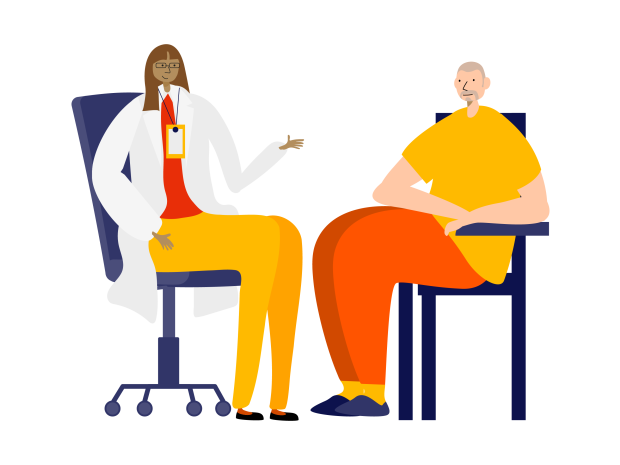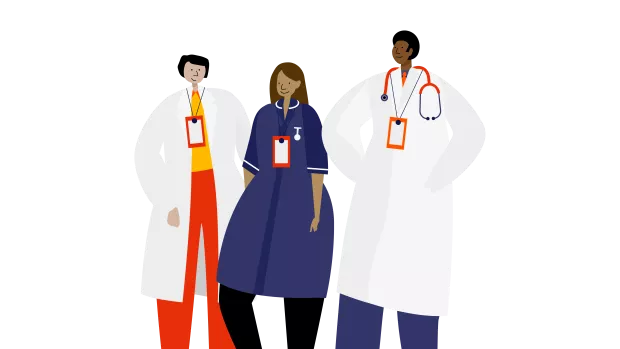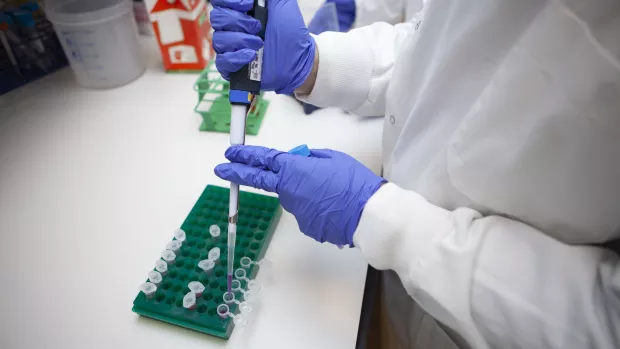
Getting treatment for MS
You have the right to ask about getting MS treatment. This is true no matter what kind of MS you have - or how long you’ve had it.
Some MS treatments help with the symptoms of MS, while others control MS itself. With these treatments you can get fewer and less serious relapses, and disability progression may slow down.
First questions about MS treatments
It’s best you speak to an MS specialist, like a neurologist who has many patients with MS. An MS nurse can also talk about treatments in general. Only an MS specialist can give you advice on treating your MS and prescribe drugs for you.
To see your specialist you don’t have to wait for your next appointment to come round. You can ask to see them before then. Ask your GP or MS nurse to book one for you.
If you don’t already have an MS specialist, ask your GP to refer you to one.
Official guidelines say everyone with MS should be offered an appointment with a specialist at least once a year to talk about their care. This is true no matter what kind of MS you have and whether you’re already on treatment or not. This is a chance to talk about how your MS might be treated.
If you haven’t seen a specialist for quite a long time you have the right to ask for an appointment. And if your yearly review doesn't happen, you should ask your GP, MS nurse or neurologist about getting one scheduled. It’s never too late to think about treatment.
If you’ve just been told you have MS, guidelines say your neurologist should have spoken to you about treatment and given you information on it when you were diagnosed. Within six weeks of this you should get a follow-up appointment where you can talk about your treatment choices.
If you have relapses with your MS, around twenty drugs can now slow down this sort of MS and reduce relapses. They're called disease modifying therapies (DMTs). Talk to your specialist about them if they haven't already mentioned them.
DMTs won’t cure MS but they can slow it down and mean you get fewer relapses. They range from less hard hitting drugs with fewer side effects to stronger ones with more serious side effects.
There's a wide range of drugs and other therapies that can help with specific MS symptoms. And steroids can help you get over a relapse sooner. Talk to your specialist, MS nurse or GP about these.
There are a number of very effective DMTs for relapsing MS.
If you don’t feel the drug you’re taking is controlling your relapses well enough, talk over other possible MS relapse treatments with your neurologist or MS nurse. This might include the stem cell therapy HSCT. In the UK HSCT is only an option if two DMTs haven’t worked for you.
For most people with progressive MS DMTs don’t work. The exception is if your MS is progressive but is classed as ‘active’. This means you still get relapses, or doctors see inflammation on your MRI scans. If you have secondary progressive MS and it’s ‘active’ then two DMTs might help you - Extavia (which is one of the beta interferons) or siponimod (Mayzent).
A new DMT called ocrelizumab (Ocrevus) can work against primary progressive MS early on and if inflammation can be seen on your MRI scans. You also need to have a score on the Expanded Disability Status Scale (EDSS) between 3.0 and 6.5. A score of 6.5 means you need two walking aids – such as canes or crutches – to walk 20 metres without having a rest. This drug has been recommended for use on the NHS for this kind of MS since 2019 in England, Wales and Northern Ireland, and in Scotland since the start of 2020.
If your MS is progressive then HSCT isn't likely to help you unless you have early primary progressive MS and inflammation is seen on your MRI scans.
But there are lots of treatments, therapies, lifestyle changes and devices that help with the symptoms or disability caused by progressive MS. Ask your GP, MS nurse or neurologist for help.
Our researchers are working to find treatments for progressive MS.
What to do when
Maybe you don’t agree with what your specialist says about treating your MS. Or perhaps you don’t understand the information they’ve given you.
It’s worth first talking to your neurologist about your concerns or if you'd like to consider a different course of treatment.
You can ask for a second opinion from another MS specialist. Discuss this with your neurologist, your GP or with the hospital or clinic where you were seen.
However, this could mean having to travel to a different hospital and your treatment could start later. Talk this through with your specialist to see what a delay might mean for you.
Find out more about getting a second opinion on the NHS choices website
It can be difficult to get an appointment with a neurologist and long waiting times are sometimes an issue.
Neurologists are meant to follow NICE recommendations and offer everyone with MS a comprehensive review of all aspects of their care at least once a year.
While you're waiting to see your neurologist, we recommend speaking to your MS Nurse about your treatment options so you're prepared when you see them.
If you've been waiting a long time for an appointment with a neurologist and are concerned about the impact on your MS, please get in touch with at [email protected]. Sharing your experiences helps us make the case locally for MS services and campaign for better access to treatments.
If you've been waiting a long time for an appointment with a neurologist and would like some information and support on what services are available to you, please contact our Helpline on 0808 800 8000 or at [email protected].
When you have a diagnosis of relapsing MS, your neurologist should guide you through which treatments you're eligible for and help you make a decision.
If you feel you're not being prescribed a DMT you're eligible for, this could be due to a number of different reasons. If you have a clinician who's reluctant to prescribe you a treatment, that doesn't mean you're not eligible for any. It's important to be aware of your treatment options before you see your specialist.
If you're unclear about why you're not being offered your preferred treatment option, we may be able to help. Contact your local Regional External Relations Officer who may be able to raise the issue with decision-makers locally.
Some treatments that could help you have either been rejected by your national level commissioner or haven't been reviewed for treating MS on the NHS yet.
Whether you'll have any success accessing these treatments will depend on how expensive they are for your local NHS to fund and whether national commissioners have explicitly recommended they shouldn't be used.
For exceptional circumstances it is possible to receive NHS funding through applying for an individual funding request.
To access treatments that haven't been approved for MS on the NHS you may want to try to get an Individual Funding Request (IFR) or Individual Patient Treatment Request (IPTR) in Scotland. These are to request funding for people who are considered to have exceptional clinical circumstances. They have to be submitted by a healthcare professional.
These requests are submitted to your local commissioner. The treatments are not routinely available and it's unlikely funding will be granted for a non-approved treatment where there are lots of people who'd like to access it for the same reason.
Your neurologist will be able to advise you on the likely success of submitting a request.
HSCT is now being funded by the NHS for people with relapsing MS who have continued to have relapses despite taking two other DMTs. However, it's not yet widely available.
NICE will review HSCT for the NHS in England and Wales once they have enough clinical trial evidence. This appraisal will decide whether it should be made more widely available.
Find out about your rights in different parts of the UK
The National Institute of Health and Care Excellence (NICE) are responsible for approving DMTs for England and Wales. Once NICE approves a treatment, the NHS across England and Wales has three months to implement that guidance. Once that has happened patients are legally entitled to be prescribed the treatment (so long as they meet the eligibility criteria).
The Department of Health, Social Service and Public safety has formal links with NICE. Once NICE approves a treatment it's reviewed locally for applicability to Northern Ireland. Where appropriate it's then endorsed for implementation in Health and Social Care (HSC). This process should be completed within 8 weeks.
The Scottish Medicines Consortium (SMC) is responsible for approving DMTs in Scotland. When the SMC approves a DMT, the NHS boards in Scotland take it into account when they decide which medicines are available in their area. But they don’t have to follow the SMC decision.
Making an official complaint
If a NICE approved treatment that you're eligible to take is unavailable in your area, you can make an official complaint.
Officers from the Patient Advice and Liaisons Service (PALS) are available in all hospitals. They offer confidential advice, support and information on health-related matters to patients, their families and carer.
If you have a complaint about your level of treatment you can contact the Patient and Client Council who support NHS patients with complaints in Northern Ireland.
Find contact details for each health trust's complaints department
If you have a complaint about your level of treatment you can contact the Patient Advice and Support Service (PASS) who provide free, confidential advice and support for NHS patients in Scotland.
If you're repeatedly denied a treatment you feel you're eligible to take, you can contact your MP, SMP or Assembly Member to help you challenge the decision. Find out who your representatives are here.
Contact our MS Helpline on 0808 800 8000 for support and information about taking this step.


